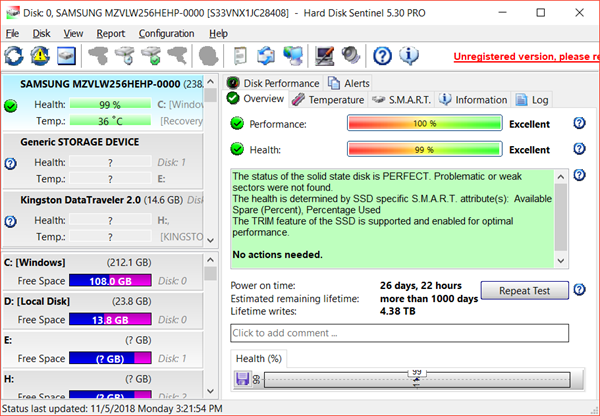

This tool provides general error reports.Moreover, you can also use this tool to know the disk transfer speed, which further helps detect disk failures and potential threats. Once installed on your system, it runs in the background to provide real-time SSD health checks and performance. This is a great tool as it works for both internal and external SSDs that are connected with USB or e-SATA. Hard disk sentinel also displays your SSD health. You can easily use this tool to find, test, diagnose, fix and generate reports for all SSD-related problems. Hard Disk SentinelĪs the name suggests, Hard Disk Sentinel is a hard disk monitoring tool, which is great for SSD monitoring. It provides the option to tweak commands for better SSD performance checks.Īlso Read: What is a Hard Disk Drive (HDD)? 3.It supports most of the SSD drives available today.
Linux ssd health mac os#
Linux ssd health free#
11 Free Tools to Check SSD Health and Performanceġ1 Free Tools to Check SSD Health and Performance 1.So, read till the end to choose the best of the best!

Moreover, for your convenience, we have mentioned which tools work on which operating systems. system, i.e., Self-Monitoring, Analysis, and Reporting Technology systems. Most of these tools function on the S.M.A.R.T.

You can easily choose anyone from this list, as per your requirements. In this article, we have listed down some of the best free tools to check SSD health. These are more delicate than the normal hard disk drive (HDD), so they need regular health checks to ensure their proper functioning.
Linux ssd health install#
However, if you plan to install SSD on your PC, there are a few points to consider, such as SSD health check, performance, and life check. Technology is advancing day by day, and SSDs are now replacing HDDs, rightfully so. SSDs are especially, beneficial for gamers as it helps load games and applications at much faster speeds than a regular hard disk. This means that after booting/restarting your computer, you can start working on it within a few seconds. Furthermore, it ensures quicker data transfer and system reboot. SSDs not only help improve the battery life but also help perform write/read operations at a higher speed. So I have absolutely no idea what caused this.SSD or Solid-State Drive is a flash-based memory drive that ensures the improved performance of your computer.
Linux ssd health full#
The first entry relating to this incidient is a mysql message: 1:22:02 /usr/sbin/mysqld: Disk is full writing. Here is what I did: df -hĭateisystem Size Used Avail Use% Eingehängt aufġ2K find -type f -print0 | xargs -0 df -hĪny explanation as to why deleting 10 GB in /tmp gave me back 51 GB on the disk? Could this point to an SSD failure? Are there any tools for Debian to test SSD health? I deleted 10 GB of files in /tmp, which strangely freed 51 GB. The disk usage always stayed around 50 % in the weeks and months before (old data is regularly expunged from the server). Today the hard drive of our server was suddenly full.


 0 kommentar(er)
0 kommentar(er)
